
Blocktrace, an Austin-based startup, is transforming the way blockchain transaction tracking is done by implementing artificial intelligence (AI) technology. Founded in 2018 by software engineer Shaun MaGruder, Blocktrace uses a chatbot named Robby the Robot to interact with data on the Bitcoin blockchain, making the analysis process faster and more efficient.
Why Blocktrace?
MaGruder, who has previously worked as the head of training at blockchain forensics firm Chainalysis, chose Bitcoin as the starting point for the Robby project due to its large sample size and extensive history. As the original cryptocurrency, Bitcoin offers a rich pool of user base addresses and a wealth of transactional data for AI analysis.
Revolutionizing Blockchain Exploration with Natural Language Processing
Robby the Robot is an AI-fortified chatbot that relies on a natural language model to understand and process human language. By storing a copy of the Bitcoin blockchain data in Blocktrace’s database and enhancing it with an AI layer, Robby allows users to ask natural language questions like a virtual assistant, significantly reducing the time spent on transaction tracking.

Benefits for Investigators and Users
The integration of AI technology and natural language processing enables users and investigators to quickly find Bitcoin addresses and identify transactions on the network with greater accuracy and detail. Instead of relying on data engineers or data scientists to translate natural language queries into SQL queries, Robby has already been trained on the data model and can swiftly fetch results for the user. This streamlined process eliminates the need for continuous training for new data scientists, resulting in a more efficient and cost-effective solution.
Testing and Future Release of Robby the Robot
Although Robby is still in its beta stage, it is expected to be made available for public use later this year. Before the chatbot’s official launch, MaGruder plans to provide a closed group with access to Robby for testing purposes. This cautious approach ensures that Robby is stable and capable of handling the types of questions that the public is likely to ask.
Gathering Feedback and Continuous Improvement
As users compare Robby to traditional blockchain explorers, they will determine the chatbot’s accuracy and effectiveness. To gather valuable feedback, Blocktrace will implement a thumbs up and thumbs down button system. A thumbs up will serve as positive reinforcement, while a thumbs down will indicate areas where Robby needs improvement.
Other Web3 Companies Leveraging AI Technology
Blocktrace is not alone in its pursuit of AI-powered blockchain analysis solutions. Other Web3 companies exploring this technology include Elliptic, Chainalysis, CipherTrace, and Nansen. Andrew Thurman, a Nansen engineer, shared his insights on the future of AI and blockchain analysis at ETH Denver. He also highlighted the importance of collaboration between Blocktrace blockchain analysts and AI researchers in improving the accuracy and efficiency of such solutions. While these companies are focused on compliance and regulatory requirements, there are also concerns about the privacy implications of using AI to analyze blockchain data.
One of the key benefits of using AI in blockchain analysis is its ability to process vast amounts of data quickly and accurately. This is especially important given the decentralized nature of blockchain networks, which can make it challenging to track and monitor transactions. By automating the process of analyzing blockchain data, AI-powered solutions can help to identify suspicious patterns and transactions in real-time, allowing for faster and more effective responses to potential threats.
Privacy Concerns Surrounding AI-Powered Blockchain Analysis
Despite the potential benefits of the Blocktrace solution and other AI-powered blockchain analysis providers, there are also concerns about the privacy implications of using these technologies. In particular, there is a risk that such solutions could be used to track the financial activities of individuals and organizations in ways that violate their privacy rights. As such, it will be important for companies developing these technologies to carefully consider the ethical implications of their work, and to ensure that appropriate safeguards are put in place to protect the privacy of users.
